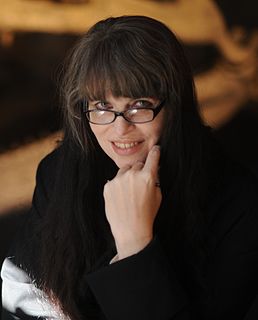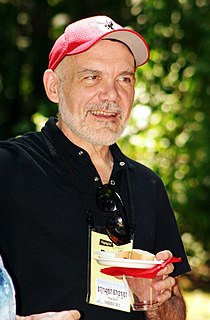A Quote by Caitlín R. Kiernan
The writing of a novel or short story or poem or whatever should elevate the audience, not drag the writer down to some level beneath herself. And she - the author - should fight always to prevent that dragging down, especially when the only possible benefit of allowing it to happen is monetary.
Related Quotes
I pretty much drink a cup of coffee, write in my journal for a while, and then sit at a computer in my office and torture the keys. My one saving grace as a writer is that, if I'm having trouble with the novel I'm writing, I write something else, a poem or a short story. I try to avoid writer's block by always writing something.
Your opening should give the reader a person to focus on. In a short story, this person should turn up almost immediately; he should be integral to the story's main action; he should be an individual, not just a type. In a novel, the main character may take longer to appear: Anna Karenina doesn't show up in her own novel until chapter eighteen.
The art of not reading is a very important one. It consists in not taking an interest in whatever may be engaging the attention of the general public at any particular time. When some political or ecclesiastical pamphlet, or novel, or poem is making a great commotion, you should remember that he who writes for fools always finds a large public. A precondition for reading good books is not reading bad ones: for life is short.
I don’t worry anymore about writing. There are times that I go through dry periods. I never go through a block. I’m always writing, but there are times where I’m just not on my game, and I’ll use that time to read some new poets, go see some art, walk down to the river and just stare at it, or have a conversation with my sister, or whatever—do whatever it is that I do in my life, hoping that I’ll get filled up enough. And something will happen, some juggling will happen and boom.
Consider it this way: what would you say if a blond homecoming queen fell in love with a short Japanese businessman? He treats her cruelly, then goes home for three years, during which time she prays to his picture and turns down marriage from a young Kennedy. Then, when she learns he has remarried, she kills herself. Now I believe you should consider this girl to be a deranged idiot, correct? But because it's an Oriental who kills herself for a Westerner–ah!–you find it beautiful.
Lately I've been thinking about the idea that all novels are, at least in some way, about the process of writing a novel - that the construction of the book and the lineage of people constructing novels are always part of the story the author is telling. I think the equivalent for memoir should be that all memoirs are, in some way, about the process of memory. Memoirs are made out of a confusing, flawed act of creation.
A short story is a sprint, a novel is a marathon. Sprinters have seconds to get from here to there and then they are finished. Marathoners have to carefully pace themselves so that they don't run out of energy (or in the case of the novelist-- ideas) because they have so far to run. To mix the metaphor, writing a short story is like having a short intense affair, whereas writing a novel is like a long rich marriage.



































